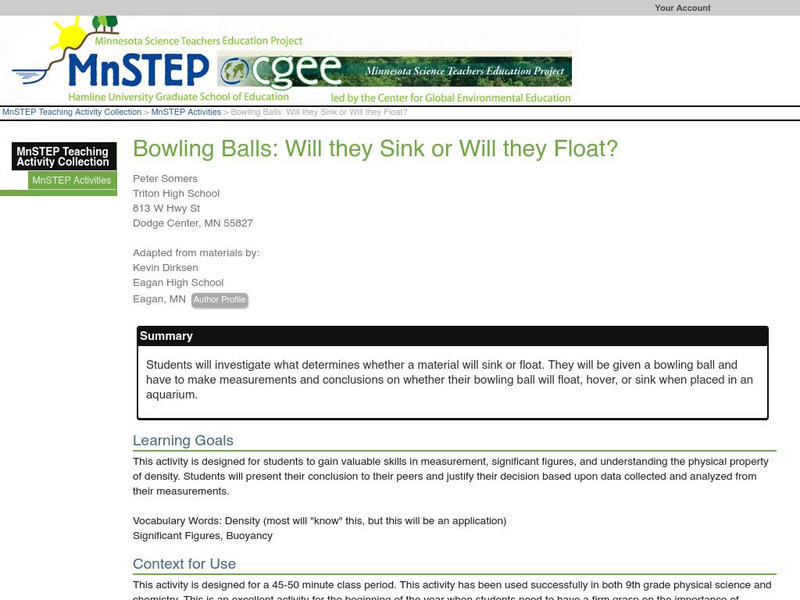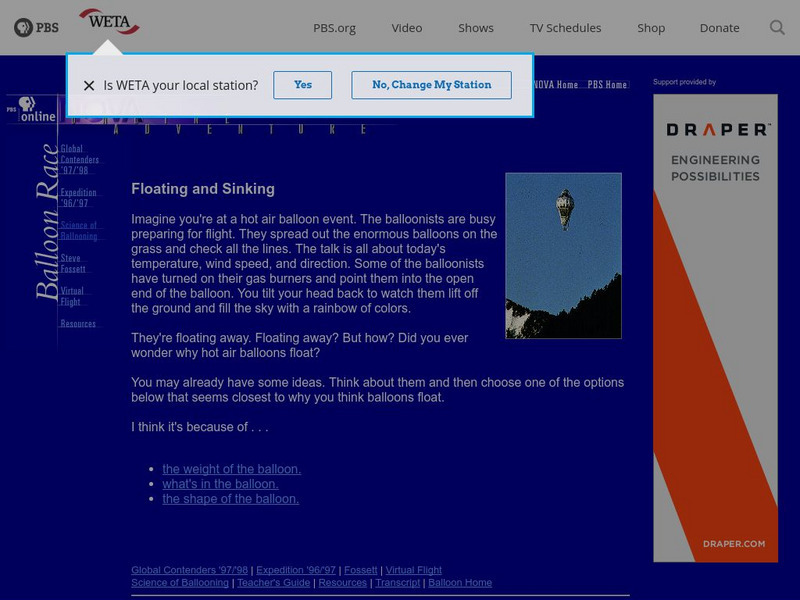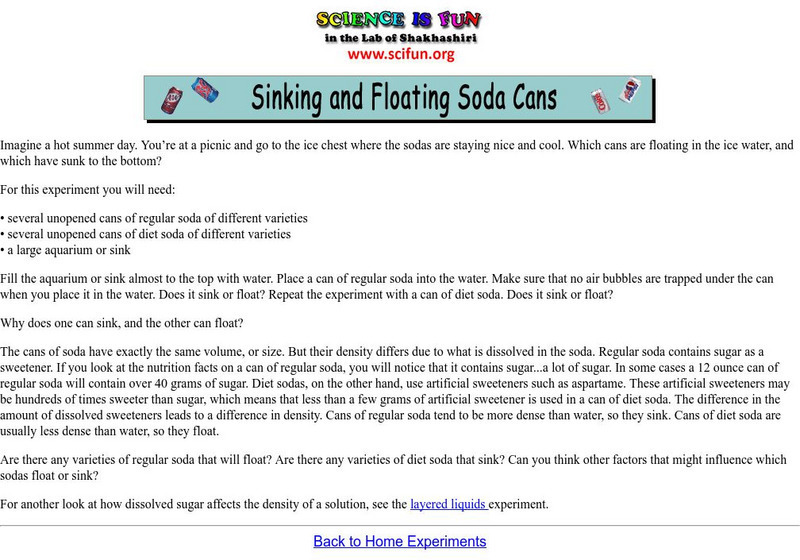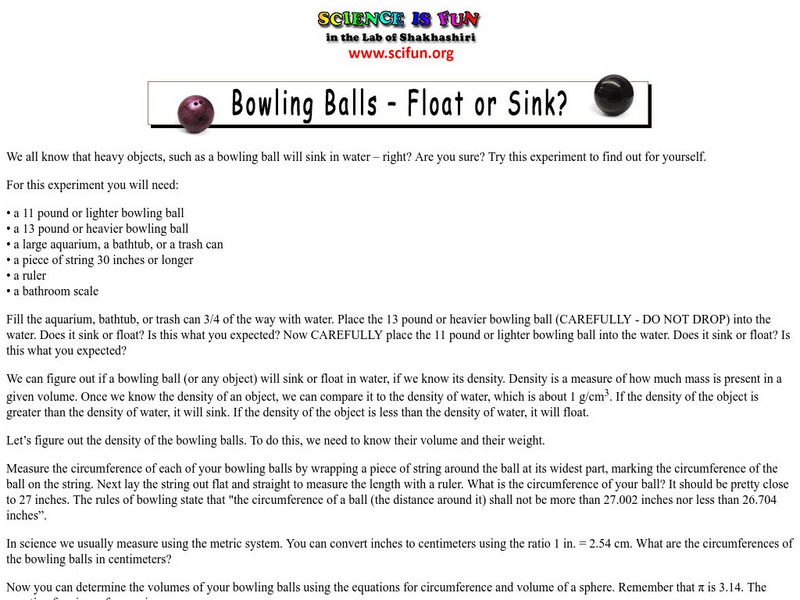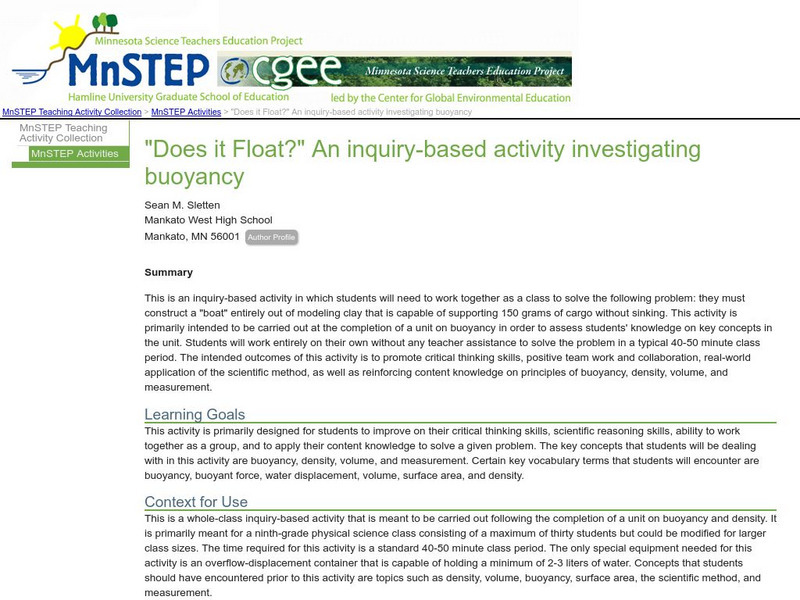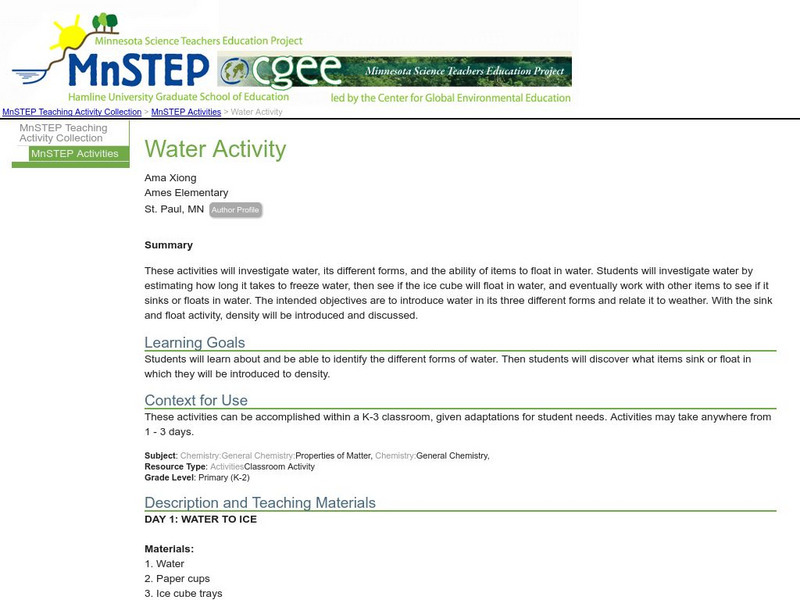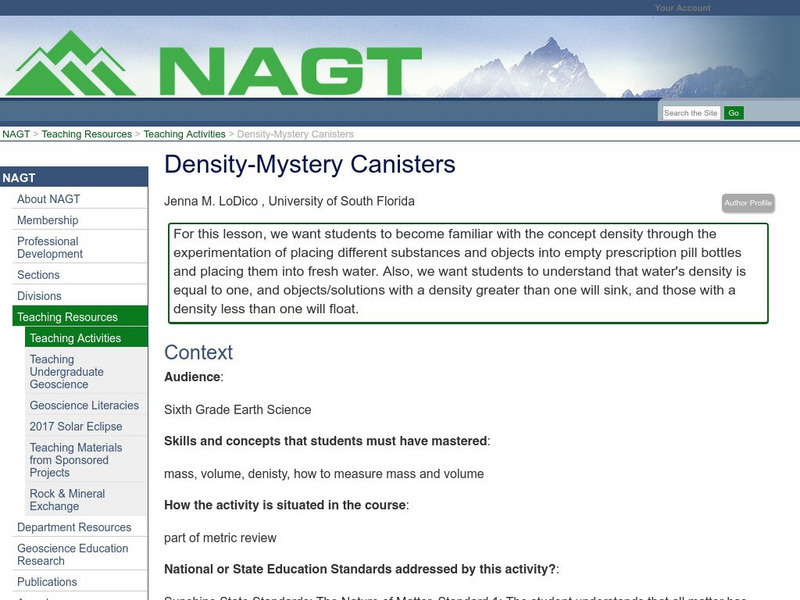Hi, what do you want to do?
American Chemical Society
Middle School Chemistry: Density: Sink and Float for Liquids
Learners determine whether a liquid will sink or float in water by comparing its density to the density of water.
Science Education Resource Center at Carleton College
Serc: Investigating Density in Solutions: How Can You Make an Egg Float?
In this activity, students will learn about density by determining how to make an egg float in water. By the end of the instructional activity, students will understand that density and weight are different and that density matters in...
Science Education Resource Center at Carleton College
Serc: Bowling Balls: Will They Sink or Will They Float?
Learners will investigate what determines whether a material will sink or float. They will be given a bowling ball and have to make measurements and conclusions on whether their bowling ball will float, hover, or sink when placed in an...
PBS
Pbs Learning Media: Floating and Sinking: Hot Air Balloons
Why do hot air balloons float? This resource from the NOVA Web site offers a series of interactive activities that illustrates the physics of hot air balloons.
American Chemical Society
Middle School Chemistry: Density: Sink and Float for Solids
Students determine whether an object will sink or float by comparing its density to the density of water.
Utah Education Network
Uen: Sink or Float
Predict and test everyday objects as to whether they sink or float.
HotChalk
Hot Chalk: Lesson Plans Page: Sink or Float?
This lesson plan is designed to have young children explore the concept of sinking vs. floating by using the skills of prediction, observation and classification.
Better Lesson
Better Lesson: Floating and Sinking Sorting in Science
Students sort objects according to whether they sink or float.
PBS
Pbs Learning Media: Sesame Street: Sink or Float Educator Guide
This is an educator's guide for a unit on things that sink or float. It includes lesson plans, experiments, and activities. Students apply the scientific method as they investigate whether objects sink or float.
Science and Mathematics Initiative for Learning Enhancement (SMILE)
Smile: Density in Relation to Float and Sink
Students find the densities of objects based on sinking or floating in this activity that demonstrates Archimedes Principle.
Science is Fun
Science Is Fun: Sinking and Floating Soda Cans
An experiment to determine if either a regular or a diet can of soda will float or sink when placed in water, and what causes this.
Science is Fun
Science Is Fun: Bowling Balls Float or Sink?
In this experiment, you test whether two different bowling balls will float or sink, then determine the density of each of the balls to see if they are less than that of water.
Science Education Resource Center at Carleton College
Serc: Investigating Floating and Sinking: Density
This investigation introduces the concepts of volume, mass, and density and how they interact. Students will make predictions of whether an object will float or sink after finding mass and volume of an object.
Utah Education Network
Uen: Does Coke Float?
Sixth graders predict if different types of coke will float or sink.
Science Education Resource Center at Carleton College
Serc: Mn Step: Sinking and Floating Water
An experiment in density where colored water, both hot and cold, are poured into containers of water at room temperature. Students will observe that the warm water rises and the cold water sinks due to their different densities.
Science Education Resource Center at Carleton College
Serc: "Does It Float?" an Inquiry Based Activity Investigating Buoyancy
This is an inquiry-based activity in which students will need to work together as a class to solve the following problem: they must construct a "boat" entirely out of modeling clay that is capable of supporting 150 grams of cargo without...
Other
National Engineers Week Foundation: Flinker
Students investigate with common objects to see if they can make something that neither floats nor sinks, but rather "flinks" in the middle.
Science Buddies
Science Buddies: How Much Weight Can Your Boat Float?
Have you ever wondered how a ship made of steel can float? In this project you'll investigate how much weight boat hulls of various shapes and sizes can support without sinking.
PBS
Pbs Learning Media: Buoyancy Brainteasers: Buoyancy Question
This interactive brainteaser from the NOVA: "Voyage of Doom" Web site challenges you to figure out what causes an object to sink.
TeachEngineering
Teach Engineering: What Floats Your Boat?
Learners use modeling clay, a material that is denser than water and thus ordinarily sinks in water, to discover the principle of buoyancy. They begin by designing and building boats out of clay that will float in water, and then refine...
Science Education Resource Center at Carleton College
Serc: Water Activity
Students investigate water by estimating how long it takes to freeze, then see if the ice cube will float in water, and eventually work with other items to see if they sink or float in water.
National Association of Geoscience Teachers
Nagt: Density Mystery Canisters
Young scholars experiment with items that sink or float, and learn that water's density is equal to one, and objects/solutions with a density greater than one will sink, and those with a density less than one will float.
Other popular searches
- Sinking and Floating
- Floating and Sinking Objects
- Sinking or Floating
- Science Floating and Sinking
- Free Floating and Sinking
- Floating and Sinking Water
- Floating and Sinking Inquiry
- Water Floating Sinking
- Sinking/floating Items
- Science Floating Sinking







